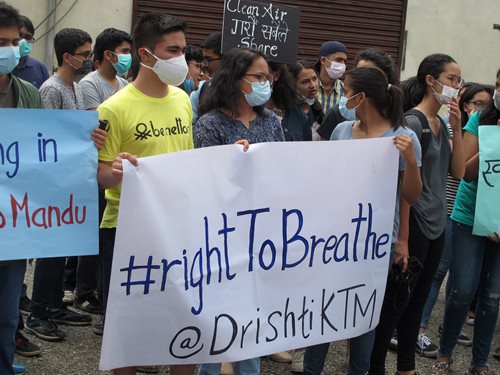The power is off again so I’m deprived of an internet connection but that’s a stimulus to jot down a few thoughts about yesterday, when I joined in a street demonstration – for the first time in decades.
Why, you ask?
When we left Nepal in 1998, water diverted from the Melamchi River via a 27-kilometre-long tunnel, was expected in the Kathmandu Valley. It was sorely needed to augment scant supplies. It was expected the following year. But the civil war and political shenanigans meant that the tunnel was only finished this year. The new pipes to bring drinking water to most households are already installed and tested but roads throughout the city are yet to be repaved. This means that vehicles churn up dust everywhere and add to the filth in the air we breathe. In addition to normal traffic, hundreds of water tankers ply the city streets bringing water by road because there is none in the pipes.
As it is, air quality in The Valley is said to be the third worst in the world. This is partly because we are so sheltered by the 2000m high retaining rim but it is also because we have too many vehicles (many of which are poorly maintained). Solid waste is burned because this system – like many in Nepal – is broken. Then as rebuilding goes on apace there are the brick factories that belch out black smoke; apparently they buy old tyres to burn for fuel.
Pondering all this, it is easy to feel overwhelmed and do nothing but grumble. Yet there are solutions, and some citizens work hard to motivate their politicians.
So it was that yesterday morning, my Nepali friend, G, and I turned up at
Nepal Communitere on the occasion of World Environment Day. People gathered to march to the Department of Roads to protest at their inactivity. G and I were by far the most seasoned amongst the 200 or so protesters who had gathered and I rather mourned my lack of foresight in not fashioning a banner proclaiming GRANNIES AGAINST FILTH or somesuch but I was inspired to meet so many young Nepalis with that fire in their bellies that made them want to make a noise.
The march was properly organised with written permission from the police to proceed. Even so when a pickup full of armed police came by, siren-wailing, G and I looked at each other wondering in trepidation how things would turn out that day. Other demonstrators felt no fear though. The chanting and banner-waving didn't pause. It continued unabated as we forged a way across the dense traffic on Pul Chowk and on all the way to the Department of Roads offices near Patan Dhoka.
The courtyard we’d entered was flooded by overnight rain and government workers had placed planks across various ponds to enable them to get into their offices. Comments were made about the irony that even the Department of Roads hadn’t troubled to organise proper paved access so that people could do their work. Turnover in government posts is fast though. It is difficult to make an impact.
Offices start late in this country – people like to eat rice before work – and unsurprisingly arriving at 10am proved too early to meet the Director General. After a while though, our chants brought out the deputy DG. He listened good-humouredly and offered to meet the protest leaders to discuss ways forward.
This felt like real democracy in action. Nepal has been through some horrendous times but elections here late in 2017 heralded a new federal system where citizens should have more access to the politicians who are supposed to represent them and this should make them more accountable. Many Nepalis are optimistic and people with the passion are reminding those in authority and those with the purse strings that they have a great deal of work to do.
Meanwhile, I wonder whether I’ll have power for long enough to post photos to augment this blog.
 |
| Protest outside the Department of Roads on World Enviroment Day |